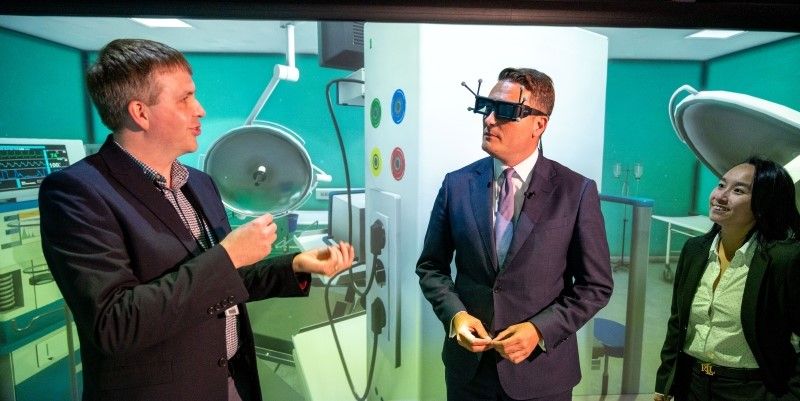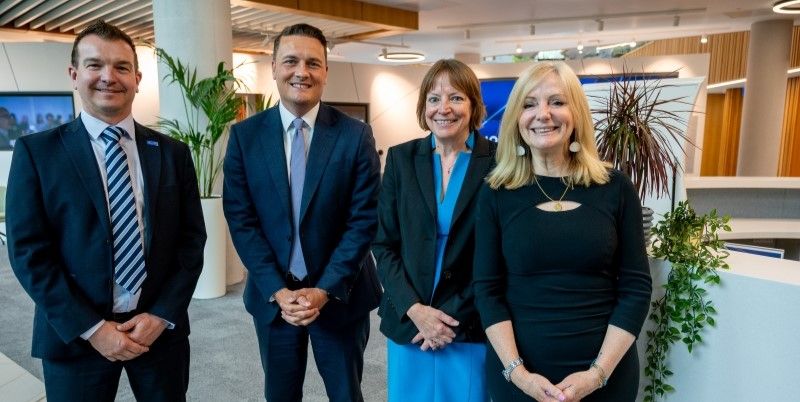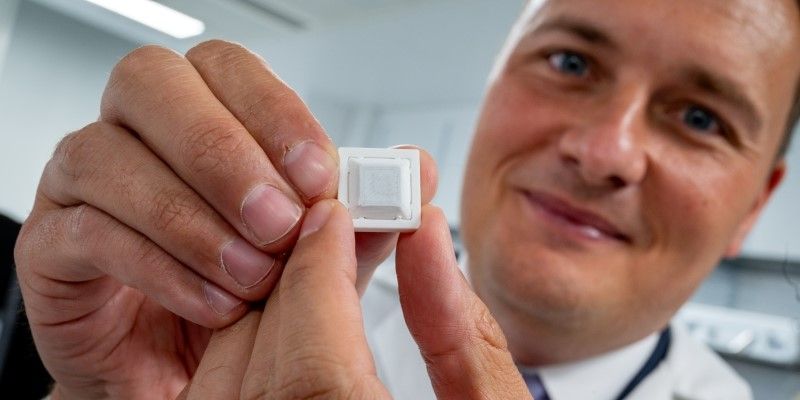
Leeds plays a crucial role in driving improved patient care through hi-tech advancements, according to Health Secretary Wes Streeting.
Institutions including the University of Leeds make the city a “healthcare innovation powerhouse”, Mr Streeting said during an event hosted by a partnership of the city’s senior leaders at innovation hub Nexus.
During the visit, the MP announced a new digital hub in Leeds city centre, being launched by the Government agency the Medicines and Healthcare products Regulatory Agency (MHRA).
“There is a global tech revolution in healthcare unfolding, and Yorkshire will help our country lead it,” said Mr Streeting, Secretary of State for Health and Social Care.
“Driving forward digital transformations like these through our Plan for Change will mean scientists get data for research quicker, inspectors can develop tech to spot problems quicker, and patients get better results.
“As a healthcare innovation powerhouse, Leeds is the perfect place to bring together the Medicines and Healthcare products Regulatory Agency’s regulatory expertise with a thriving tech community, world-class universities, and strong NHS presence.”

Members of the discussion panel included Tracy Brabin, Mayor of West Yorkshire; Katie White, MP for Leeds North West; Councillor James Lewis, Leader of Leeds City Council; Kate Lodge, Partnership Director, Leeds Academic Health Partnership; Magnus Harrison, Chief Medical Officer, Leeds Teaching Hospitals NHS Trust; Richard Stubbs, Chief Executive, Health Innovation Yorkshire and Humber and Chair of the national Health Innovation Network; and Maddie Julian, CEO of DigiBete, a ‘made in Leeds’ success story transforming care for children across the UK and worldwide.
Panel chair Professor Shearer West, Vice-Chancellor and President of the University of Leeds, said: “Leeds is undoubtedly at the forefront of digital healthcare innovation.
“By continuing to build our expertise in this sector, we can make significant and lasting impact in health provision for both our region and nationally.
“It’s vital that our work, in collaboration with partners including the NHS Trust and Leeds Academic Health Partnership, results in tangible health benefits that improve people’s lives.”
Tracy Brabin, Mayor of West Yorkshire said, “With one of the fastest growing Health Tech sectors in Europe and as a leader in digital health, it makes sense for the Medical and Healthcare Products Regulatory Agency to have a base here, and I’m so pleased with their plans to do so.
“West Yorkshire continues to produce world-leading medical and technological advancements, and working with the University of Leeds, Leeds Teaching Hospitals NHS Trust and other partners, we will unlock the immense potential within our life sciences sector to improve lives and boost growth.”
At Nexus, Mr Streeting met the founders of Microneedle Solutions, which are led by former University of Leeds biotechnology students who developed self-adhesive patches containing microscopic vaccine needles.

He then saw a demonstration of a virtual hospital surgical theatre at the University’s environment simulation centre Virtuocity.
There is a global tech revolution in healthcare unfolding, and Yorkshire will help our country lead it.
The new MHRA digital hub will be located in Wellington Place in Leeds city centre. It forms part of the Agency’s broader strategy to strengthen digital capabilities and deliver better outcomes for patients, the public and industry.
It will also enable closer collaboration with digital health networks, NHS organisations, and leading academic institutions nationwide.
The move supports the Government’s Places for Growth strategy, which aims to ensure that public bodies’ opportunities and expertise are more evenly distributed across the UK.
Director of Leeds Academic Health Partnership, Kate Lodge, explained why the UK’s third largest city is an ideal location for the new digital hub: “Leeds ranks third internationally as a centre for healthtech innovation, and the Government move to launch a new MHRA hub in the city recognises, and builds upon, our globally-leading strengths in data, digital and AI.
“Our health innovation ecosystem – represented by Health Innovation Leeds – is one of the most interconnected in the UK.
“Today’s roundtable discussion – attended by partners from academia, healthcare, local council and business – was a powerful example of the radical collaboration that enables Leeds to go further faster in transforming health and care for everyone.”
Dr Magnus Harrison, Chief Medical Officer at Leeds Teaching Hospitals NHS Trust, opened the panel discussion, outlining the city’s vision for neighbourhood health: “In Leeds, we’re tackling some of the hardest health challenges with a whole-city approach, where we work together across organisations and sectors, with local people at the heart of everything we do.
“Leeds Teaching Hospitals NHS Trust is one of the largest in the UK, and our world-leading work is rooted in reality. Together with partners, we’re using data to identify and address tomorrow’s challenges, today. This means we can better treat or prevent disease, reduce health inequalities, and support people at home or in their communities.
“As a city, we have the vision, ambition and ability to transform health and care. The new MHRA hub will help us realise these ambitions, making it even easier to innovate in Leeds, and ultimately to make a real difference to people’s lives – locally, nationally and across the world.”
Further Information
For more information, please contact the University of Leeds Press Office at pressoffice@leeds.ac.uk
Main image : Middle – Wes Streeting wearing a virtual reality headset, Secretary of State for Health and Social Care joined by left, Peter Woodthorpe, Programme Manager at Virtuosity and right Dr Yee Mun Lee, Associate Professor in the Institute for Transport Studies at the University of Leeds.